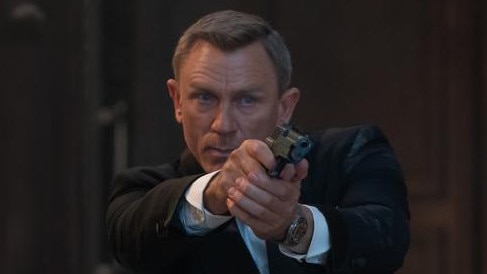Keeping the English end up with 007 on side

But I had a devilishly difficult time watching the latest instalment in a franchise that seems, given the main character’s talent for evading death and finding his way into the arms of the perfect biological mate, curiously preoccupied with morbidity.
You Only Live Twice (1967) was followed by Live and Let Die (1973), A View to Kill (1985), Licence to Kill (1989), Tomorrow Never Dies (1997), Die Another Day (2002), and now we have the somewhat misleadingly titled No Time to Die.
The problem with No Time to Die is not really Daniel Craig’s Bond, who seemingly has retired to a gymnasium in Jamaica when we meet him again and looks as hale and, it has to be said, as sour as ever. Nor is it the convoluted plot, the implausible premise, the lame villains, the dizzying pace.
It’s all about context. I happened to watch Bond’s exploits shortly after I’d endured the misadventures of the touring English cricket team in Hobart, after earlier this cricket season witnessing their capitulation in Brisbane, Melbourne and Adelaide; in Sydney Joe Root’s men salvaged a draw, but not, I wouldn’t have thought, terribly much in the way of pride. Bond doesn’t play to draw, let alone lose. The stakes – global destruction – are usually too high. But you’d think the restoration of British pride after the chaos of Brexit and the genial bumbling of Prime Minister Boris Johnson would be motive enough for a show of British spine.
Bond always gets the girl, turns the tables (after first drinking his adversary under them), defies the odds, gets his man, wriggles out of a tight corner: in short, prevails.
Did any member of the English cricket team prevail in a one-on-one contest with the Australians in this Ashes series? There was Jonny Bairstow’s ton, Mark Wood’s always-threatening 150km/h-plus bowling, Stuart Broad’s tireless wobble-seamers? That was about it.
The English team’s ensemble effort – its collective talent for finding novel ways to lose wickets, sessions and entire games – brings to mind the indignities suffered by Bond’s hapless adversaries such as Moonraker’s Hugo Drax, who is shot by Roger Moore’s 007 with a poison dart and ejected into outer space, Bond uttering the words: “Take a giant step for mankind!”
Then there is Emilio Largo in Thunderball (shot in the back with a harpoon by his mistress); and Auric Goldfinger in the movie bearing his name (plunging to death from a depressurising plane after being sucked from a shattered window). Live and Let Die’s Mr Big, for his part, explodes messily after Bond forces him to swallow a compressed gas pellet. Quips the merciless Bond: “He always did have an inflatable opinion of himself.” In For Your Eyes Only the evil genius Ernst Stavro Blofeld is dropped by Bond from a helicopter down an industrial smoke stack, killing him instantly.
I don’t know what the English cricket team had been doing in the off season. Net sessions and strategy, one suspects. But I’m surprised the team shrink didn’t sit them down and force them through the Bond films – with the exception of “Aussie” George Lazenby’s in On Her Majesty’s Secret Service – in the hope their deeds on the pitch might imitate those of the cold and ruthless M16 superhero in the field.
Understated invincibility is the presiding ideal behind Ian Fleming’s original Bond novels and the many films they spawned. And the glamour of supremacy can be a difficult thing for a country that has known it to shake off, especially in popular culture.
Fleming worked in naval intelligence in World War II and his experiences at T-Force, which was focused on the acquisition of military secrets or intellectual assets, and No.30 Commando, an assault unit that distinguished itself on D-Day, seem to have come together in the idea of Bond, who is as much a commando with a brain as he is a thinking man with a gun (or a hunting knife, poison-tipped dart or weaponised plutonium rod).
But the myth of supremacy kind of sticks in the throat when swallowed, as it was this summer, with a dose of sporting subordination.
There’ll be more English cricketing triumphs and Bond, despite his death obsession, will never really die. I’m waiting for the next instalment, rumoured to be titled Googlefinger. It’s about a blond Australian wrist spinner whose schemes of world cricketing domination are thwarted when 007, played by Idris Elba, learns how to pick his wicked wrong-un, smashes him for a ton in 17 balls, and neutralises his superpower.
Luke Slattery is a Launceston-based writer and journalist.



I love a rollicking good James Bond movie as much as the next chap. As a child of the early 1960s – a child who learnt to read and write and kick a soccer ball in outer London – I was raised on 007’s peculiarly British blend of spine, sangfroid, equipoise, marksmanship, functional alcoholism, crash avoidance and derring-do.